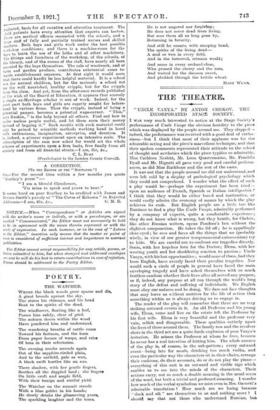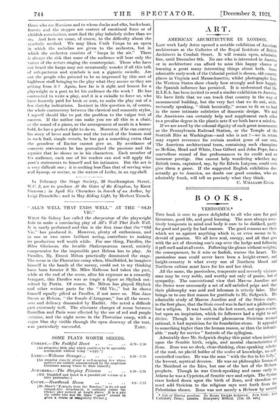THE THEATRE.
" UNCLE VANYA." BY ANTON CHEKOV. THE INCORPORATED STAGE SOCIETY.
I was very much interested to notice at the Stage Society's performance of Uncle Vanya the obvious hostility to the piece which was displayed by the people around me. They clapped— indeed, the performance was received with a good deal of enthu- siasm—but I think that most of their applause was for the admirable acting and the piece's marvellous technique, and that their spoken comments represented their attitude to the school of thought and aesthetics which the piece typifies so admirably. Miss Cathleen Nesbitt, Mr. Leon Quartermaine, Mr. Franklin Dyall and Mr. Hignett all gave very good and careful perform- ances, as did Miss Rathbono and the rest of the caste.
It was not that the people around me did not understand, and were left cold by a display of pathological psychology which they could not comprehend. I wonder what the effect of such a play would be—perhaps the experiment has been tried— upon an audience of French, Spanish or Italian intelligentsia ? I think that they would bo either bored and inattentive, or would coolly admire the economy of means by which the play achieves its ends. But English people are a little too like Russians to find a play like Uncle Vanya, admirably performed by a company of experts, quite a comfortable experience ; they do not know what is wrong, but they bristle, for Chekov, like other Russian writers, opens Pandora's box without tho slightest compunction. He takes the lid off ; he is appallingly clear-eyed ; he sees and faces all the things that we (probably wisely, in view of our greater temperamental extroversion) try to hide. We are careful not to confront our tragedies directly. Sonia, with her hopeless love for the Doctor; Elena, with her wasting youth and her shuddering reaction to passion ; Uncle Vanya, with his lost opportunities ; would none of them, had they been English, have overtly faced their peculiar tragedies. Nor would such a circle of people in general have faced the main enveloping tragedy and have asked themselves with eo much fruitless candour whether their lives after all served any purpose, or if, indeed, any purpose at all ran through the world's long story of the defeat and suffering of individuals. We English must obey our natures and be doing. We dare not face thoughts that may leave us without motives for the life of action that something within us is always driving us to engage in.
The reader of the play will remember that there arc no very striking outward events in it. An old Professor and his young wife, Elena, come and live on the estate left the Professor by his first wife. Elena is very beautiful and the professor very vain, selfish and disagreeable. These qualities entirely upset the lives of those around them. The family row and the revolver shots in the third act are a quite futile explosion of poor Vanya's irritation. He misses the Professor at whom he fires, because he never has a real intention of hitting him. The whole essence of the play is, of course, in the sub-pattern ; every outward event—being late for meals, drinking too much vodka, and even the particular way the characters sit in their chairs, arrange their cushions, do their accounts, do or do not play the piano— everything of this sort is an outward and visible sign which enables us to see into the minds of the characters. Their actions carry, not so much a double meaning in the usual sense of the word, but both a trivial and profound meaning. I wonder how much of the verbal symbolism we miss even in Mrs. Garnett's admirable translation ? How much are wo losing because duck and elk " are themselves to us and nothing more ? I should say that not those who understand Russ;an. but
those who are Russians and to whom ducks and elks, buckwheat, forests and the steppes are centres of emotional force or of childish associations, must find the play infinitely richer than we do. And here we come, of course, to the difficulty about the symbolic method. We may liken Uncle Vanya to an opera in which the melodies are given to the orchestra, but in which the orchestra consists of " harps in the air." There is always the risk that some of the audience will hear only the voices of the actors singing the counterpoint. Those who have not heard the harps may not unnaturally wonder if all this talk of sub-patterns and symbols is not a gigantic swindle. Are not the people who pretend to be so impressed by this sort of highbrow stuff bringing to the play what they assure us they are getting from it ? Again, how far is it right and honest for a playwright or a poet to let his audience do the work ? He has contracted to write a play, and it is a swindle to force us, who have honestly paid for book or seat, to make the play out of a few sketchy indications. Instinct in this question is, of course, the whole controversy between the classical and romantic styles. I myself should like to put the problem to the vulgar test of success. If the author can make you see all this in a chair, or the sound of a piano, or the arrangement of meals in a house- hold, he has a perfect right to do so. Moreover, if he can convey his story of loves and hates and the travail of the human soul in such frail, simple vessels, he has got a something extra that the grandeur of Racine cannot give us. By avoidance of concrete statements he has generalized the passions and the agonies that he shows us in his characters. Each member of his audience, each one of his readers can and will apply the poet's statements to himself and his intimates. But the art is a very difficult one ; it is nothing lessZran that of serving wine and hyssop, or nectar, or the waters of Lethe, in an egg-shell.











































 Previous page
Previous page